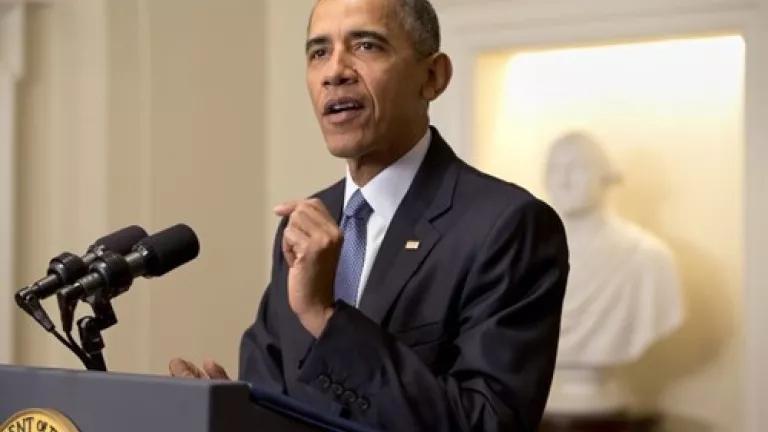
Six decades ago, in the aftermath of the Korean War, my parents left their native land and came to the United States in search of a brighter future for themselves and their children. They came during a moment of unquestioned American leadership in a world of promise, uncertainty, and hope.
Those same themes echoed through my mind as I boarded my flight home from Paris a few days ago. There, for the first time in history, the world stood united against the dangers of climate change, determined to take real action to move away from the dirty fossil fuels driving the problem and toward cleaner, smarter ways to power our future without imperiling our world.
The agreement is a testament to the growing global consensus that we face a common problem only collective action can solve. It's a tribute to tremendous effort by every nation. And it's an affirmation of what we can accomplish, as a global community, when we look beyond our differences to gather on common ground.
This agreement could not have happened, though, without American leadership. And, as always, our leadership abroad begins with leadership at home.
Jacquelyn Martin/AP
Since taking office nearly seven years ago, President Barack Obama has done more to protect future generations from the growing dangers of climate change than any other leader at any time and in any place on the face of the planet. By reducing the dangerous carbon pollution from our cars, trucks, and dirty power plants, we're on track to cut our national carbon footprint at least 26 percent by 2025, as compared with 2005 levels. We've already trimmed that footprint 10 percent in the past decade, even as our economy grew 16 percent.
We're working closely with countries like China and India to help them find ways to hold down the growth of their carbon pollution, even as their economies expand and the lives of their people improve. And we provided $430 million in grants last year alone to help low-income countries cope with the devastation of climate change and invest in clean energy options, an amount we're going to double by 2020.
Our businesses are leading, too, with General Motors, Apple, Google, Walmart, and 150 other nameplate American corporations pledging to get more clean power from the wind and sun, invest in efficiency, and otherwise reduce their own carbon footprints. And Citigroup, the Bank of America, and Goldman Sachs have together pledged to invest at least $325 billion in clean energy over the coming decade.
The United States has joined with France, Germany, and 17 other countries to pledge a doubling of our research and development spending on clean energy projects over the next five years. Meanwhile, Bill Gates, Mark Zuckerberg, Jeff Bezos, and two dozen other billionaire investors are putting together an innovation fund to help bring promising new ideas to market.
We're doing what's right for our people here at home. We're doing what's right for the world. The Paris agreement means everyone else will do their part as well, 187 countries, each with its own plan to help curb the global carbon footprint.
Will we all contribute exactly the same? Of course not. That isn't how international cooperation works or has ever been designed to work. In international relations, as in human relations, we partner with those who share our values and goals, then each nation pulls its own weight in accordance with its resources and its place in the arc of development.
The Paris climate agreement gathers the nations of the world around a growing global consensus for change, to shift to a low-carbon global economy. We won't get there with this agreement alone. The agreement does, though, give us the tools we need to get started now. We'll review our progress, share our successes and failures, then get back together again in 2020 to ratchet up our ambition and build on our gains. And we'll stay at it for as long at it takes.
That's the great promise of Parisâ--ânot that we would ever walk away with an overnight solution to a climate crisis that's taken centuries to create, but that we would come away with a blueprint for the action we need to make real progress today and even more tomorrow.
The promise of Paris has become the hope of the world, our best hope, perhaps, for our only world. In this season of hope, at home and abroad, I'm grateful for leaders like Barack Obama and all the others who have championed this cause, in their cities, their states and provinces, across their nations, and around the world.
Together, we have turned a great tide, much as generations before us have done, in our quest for a brighter future for ourselves and our children. Now we must turn the promise of Paris into the action we need to protect our world and all it supportsâ--âtoday, tomorrow, and always.
